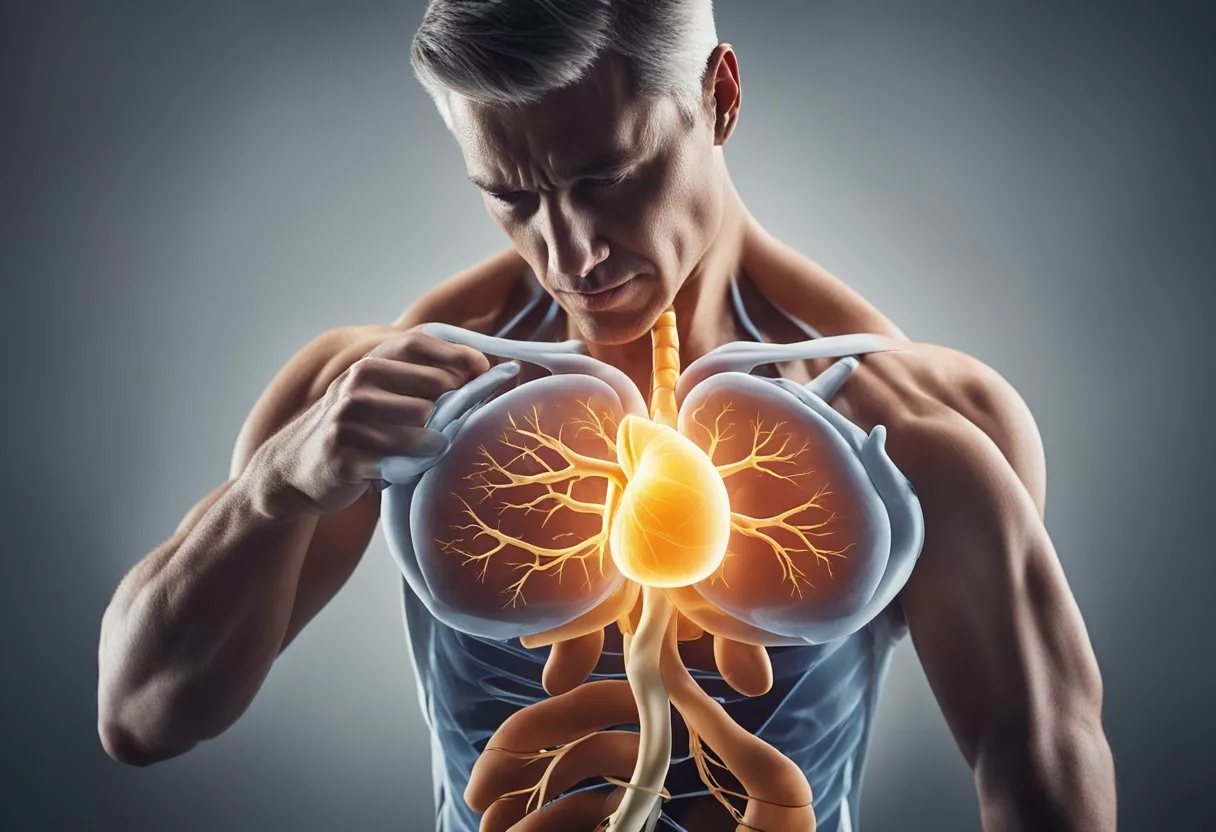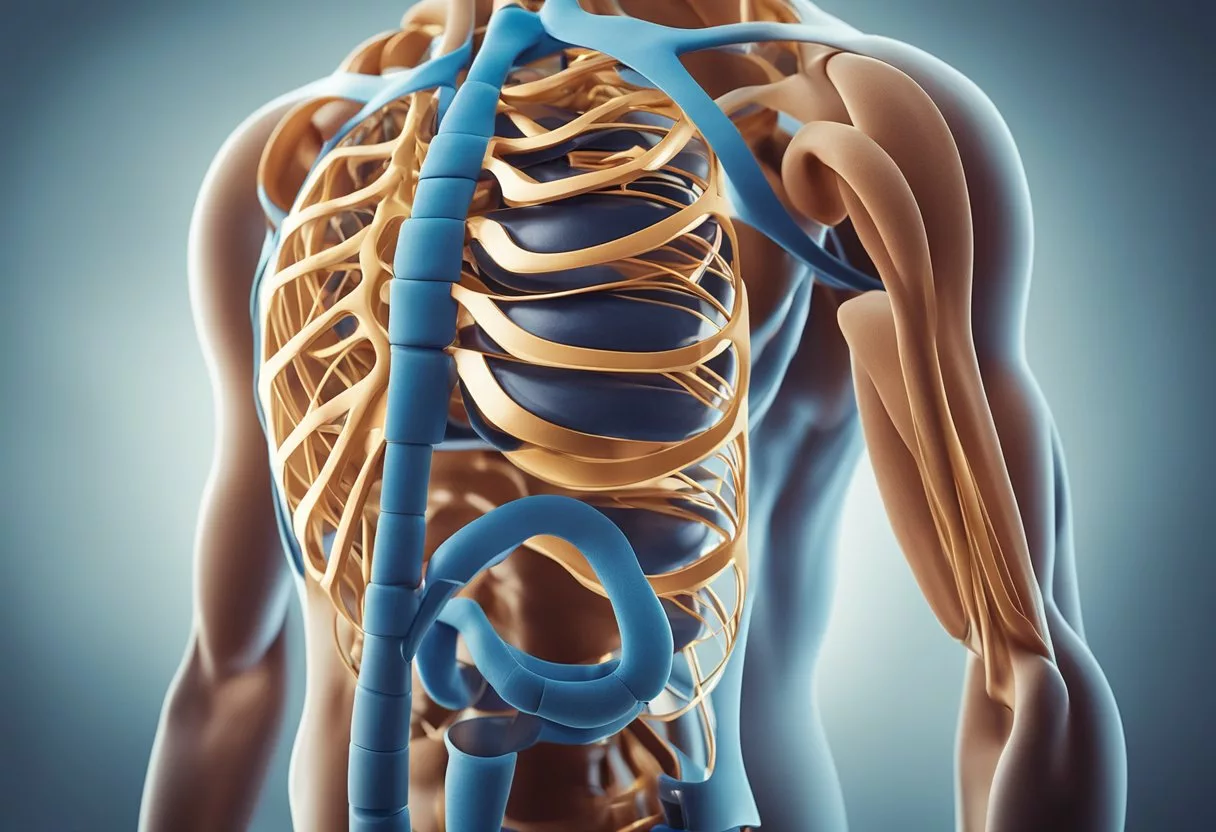Potassium is a vital mineral that plays a key role in our body’s functions. When potassium levels drop too low, it can lead to a condition called hypokalemia. This condition can affect various parts of the body and cause uncomfortable symptoms.

Low potassium levels can cause weakness, fatigue, muscle cramps, and irregular heartbeats. These symptoms occur because potassium is essential for proper nerve and muscle function. When levels are low, the body struggles to perform these basic tasks efficiently.
There are many reasons why someone might develop low potassium. Common causes include diarrhea, vomiting, certain medications, and some medical conditions. Eating a diet rich in potassium-containing foods like fruits, vegetables, and beans can help maintain healthy levels.
Key Takeaways
- Low potassium affects muscle and nerve function, causing various symptoms
- Diarrhea, vomiting, and certain medications can lead to low potassium levels
- Eating potassium-rich foods helps maintain healthy potassium levels in the body
Understanding Hypokalemia

Hypokalemia is a condition where potassium levels in the blood drop too low. This can affect how cells and organs work in the body. Knowing what hypokalemia is and how potassium functions helps explain its effects.
Defining Potassium’s Role in the Body
Potassium is a key mineral in the body. It helps cells, nerves, and muscles work right. The body needs potassium to:
• Keep heart rhythm steady • Move nutrients into cells • Remove waste from cells • Control blood pressure • Help muscles contract
Potassium is an electrolyte. This means it carries an electric charge in the body. The right balance of potassium inside and outside cells is crucial. This balance lets nerves send signals and muscles move.
What Is Hypokalemia?
Hypokalemia occurs when blood potassium levels fall below 3.5 millimoles per liter (mmol/L). A blood test can show if levels are too low. Causes may include:
• Too much potassium lost through urine • Vomiting or diarrhea • Not eating enough potassium-rich foods • Some medicines like diuretics
The kidneys usually keep potassium levels steady. But certain health issues can make this hard. Mild cases may have no signs. More severe cases can cause:
• Weakness • Fatigue • Muscle cramps • Abnormal heart rhythms
Doctors treat hypokalemia based on its cause and how low potassium levels are. This may involve eating more potassium-rich foods or taking supplements.
Causes of Low Potassium Levels

Low potassium can happen for several reasons. These include not getting enough in your diet, losing too much through bodily fluids, or certain health issues.
Dietary Deficiencies
Not eating enough potassium-rich foods can lead to low levels. Common sources include:
- Bananas
- Oranges
- Potatoes
- Spinach
- Beans
People with eating disorders may be at higher risk. Crash diets or fasting can also cause potassium to drop.
Increased Loss Through Urine or Digestive Tract
The body can lose too much potassium through bodily fluids. This often happens due to:
- Vomiting or diarrhea
- Excessive sweating
- Overuse of laxatives
- Certain medicines like diuretics
Diuretics make you pee more, which can flush out potassium. Some antibiotics may also increase potassium loss.
Medical Conditions Impacting Potassium Levels
Several health issues can affect potassium balance:
- Kidney disease: The kidneys help regulate potassium. When they don’t work well, levels can drop.
- Adrenal disorders: These glands make hormones that control potassium. Problems here can lead to low levels.
- Cushing’s syndrome: This causes high cortisol, which can lower potassium.
- Gitelman syndrome: A rare genetic disorder affecting kidney function and potassium levels.
Certain gut problems can also make it hard for the body to absorb potassium from food.
Symptoms of Hypokalemia

Low potassium levels in the body can cause a range of symptoms. The severity of these symptoms often depends on how low potassium levels have dropped.
Mild to Moderate Hypokalemia Symptoms
Mild to moderate hypokalemia may cause subtle signs that are easy to overlook. Fatigue is a common early symptom. People may feel tired and weak, especially in their muscles.
Muscle problems are frequent. Individuals might experience cramps, especially in their legs. Some may notice twitches or mild spasms in their muscles.
Digestive issues can occur. Constipation is a possible sign of low potassium. Some people may also feel bloated or have stomach discomfort.
Mild numbness or tingling, particularly in the hands and feet, can happen. This sensation may come and go or be constant.
Severe Hypokalemia Symptoms
Severe hypokalemia can lead to more serious and noticeable symptoms. Extreme muscle weakness may occur, sometimes leading to paralysis.
Heart problems are a major concern. People might experience palpitations or irregular heartbeats called arrhythmias. These can be dangerous if left untreated.
Breathing difficulties can arise. In severe cases, respiratory failure may occur due to weakened breathing muscles.
Psychological symptoms may appear. Some individuals experience confusion or mood changes. In rare cases, hallucinations can occur.
Severe hypokalemia requires immediate medical attention. It can be life-threatening if not treated promptly.
Diagnosing Hypokalemia
Doctors use several methods to diagnose low potassium levels in the body. These include examining the patient, reviewing their medical history, and performing specific tests.
Physical Examination and Medical History
A doctor will start by asking about symptoms and medical history. They may look for signs like muscle weakness or an irregular heartbeat. The doctor might ask about:
- Recent illnesses with vomiting or diarrhea
- Use of diuretics or other medications
- Diet and fluid intake
They will check blood pressure and heart rate. The doctor may test muscle strength and reflexes too.
Laboratory Tests and Other Procedures
Blood tests are the main way to diagnose hypokalemia. A normal potassium level is 3.6-5.2 mmol/L. Levels below 3.6 mmol/L indicate low potassium.
Other tests may include:
- Urine tests to check potassium loss
- Electrocardiogram (ECG) to look for heart rhythm changes
- Tests for other electrolytes like sodium and magnesium
Sometimes, doctors order more tests to find the cause of low potassium. These might check kidney function or hormone levels.
Treating Low Potassium
Treating low potassium involves dietary changes, supplements, and managing underlying health issues. The right approach depends on the cause and severity of the deficiency.
Dietary Adjustments and Potassium-Rich Foods
Eating potassium-rich foods is a key step in raising potassium levels. Some excellent sources include:
- Bananas
- Potatoes (with skin)
- Beans
- Spinach
- Nuts
- Fish
- Orange juice
- Squash
A balanced diet with these foods can help maintain healthy potassium levels. It’s important to eat a variety of potassium-rich foods, not just one or two.
Adding salt substitutes that contain potassium chloride can also boost intake. However, people should check with a doctor before using these, especially if they have kidney problems.
Use of Potassium Supplements and Medications
When diet alone isn’t enough, potassium supplements may be needed. These come in various forms, including:
- Liquid
- Powder
- Tablets
Doctors often prescribe oral potassium for mild to moderate deficiency. In severe cases, intravenous (IV) potassium might be necessary.
It’s crucial not to take potassium supplements without medical guidance. Too much potassium can be harmful, especially for people with kidney issues.
Monitoring and Managing Underlying Conditions
Treating the root cause of low potassium is essential for long-term management. Common causes include:
- Certain medications (e.g., diuretics)
- Digestive issues (e.g., chronic diarrhea)
- Kidney problems
Regular blood tests help monitor potassium levels. Doctors may adjust medications or treat underlying conditions to prevent future deficiencies.
In some cases, magnesium supplements might be needed alongside potassium. Low magnesium can make it harder for the body to maintain potassium levels.
Staying hydrated and limiting alcohol intake can also help maintain proper potassium balance.
Preventing Hypokalemia
Keeping potassium levels in check involves lifestyle changes and regular health monitoring. A balanced diet and timely medical check-ups play crucial roles in preventing low potassium.
Lifestyle Changes and Dietary Practices
Eating potassium-rich foods is key to maintaining healthy levels. Fruits like bananas, oranges, and melons are excellent sources. Vegetables such as spinach, broccoli, and potatoes also contain high amounts of potassium.
Limiting sodium intake helps balance potassium levels. Too much sodium can lead to increased potassium excretion. Reducing processed foods and adding less salt to meals can make a difference.
Staying hydrated is important. Adequate water intake helps maintain proper electrolyte balance, including potassium. Aim for 8 glasses of water daily.
Avoiding excessive alcohol consumption is advisable. Alcohol can interfere with potassium absorption and increase its loss through urine.
Regular Health Check-Ups and Blood Level Monitoring
Regular blood tests can detect low potassium early. A healthcare provider can recommend appropriate testing frequency based on individual risk factors.
People with chronic conditions like kidney disease or high blood pressure need more frequent monitoring. These conditions can affect potassium balance.
Medication reviews are important. Some drugs can lower potassium levels. A doctor can adjust medications if needed to prevent hypokalemia.
Checking magnesium levels is also beneficial. Low magnesium can contribute to potassium deficiency. Addressing both can help maintain proper electrolyte balance.
Complications of Hypokalemia

Low potassium levels can cause serious problems in the body. These issues affect the heart, muscles, and nerves. The effects can range from mild to severe, depending on how low potassium levels drop.
Impact on Heart Health
Abnormal heart rhythms are a major risk of hypokalemia. The heart relies on potassium to function properly. When levels are low, the heart may beat too fast, too slow, or irregularly.
In severe cases, this can lead to:
- Atrial fibrillation
- Ventricular fibrillation
- Cardiac arrest
These conditions can be life-threatening if not treated quickly. People with heart disease are at higher risk for these complications.
Effects on Muscular Function
Low potassium affects muscles throughout the body. Muscle weakness is common, even with mild hypokalemia. As potassium levels drop further, more serious issues can occur:
- Severe muscle cramps
- Muscle breakdown (rhabdomyolysis)
- Paralysis
In extreme cases, the muscles that control breathing may be affected. This can lead to respiratory failure, a medical emergency.
Influence on Nervous System
The nervous system also depends on proper potassium levels. Hypokalemia can disrupt nerve function, causing various symptoms:
- Tingling or numbness
- Confusion
- Mood changes
In severe cases, seizures may occur. The brain can also be affected, leading to changes in mental status or even coma.
Chronic low potassium can damage nerves over time. This may cause lasting problems with sensation and movement.
Frequently Asked Questions

Low potassium levels can cause various symptoms and health issues. Proper diagnosis and treatment are important for managing this condition effectively.
What are the common symptoms of low potassium in individuals?
Low potassium symptoms often include weakness, fatigue, and muscle cramps. Some people may experience irregular heartbeats or frequent urination.
Severe cases can lead to more serious problems like abnormal heart rhythms.
Can a deficiency in potassium indicate the presence of cancer?
Low potassium itself is not a direct indicator of cancer. However, certain cancers and cancer treatments can sometimes affect potassium levels.
It’s important to consult a doctor for proper evaluation of any unexplained symptoms or health concerns.
What are potential life-threatening effects of severe hypokalemia?
Severe hypokalemia can cause dangerous heart arrhythmias. This condition may also lead to muscle paralysis or respiratory failure in extreme cases.
Prompt medical attention is crucial if severe symptoms develop.
Which medications are known to deplete potassium levels in the body?
Diuretics and certain antibiotics can lower potassium levels. Some laxatives and steroids may also affect potassium balance.
Patients should discuss potential side effects with their healthcare provider when starting new medications.
How can one effectively manage low potassium from home?
Eating potassium-rich foods like bananas, spinach, and sweet potatoes can help. Staying hydrated and avoiding excessive alcohol intake are also important.
For mild cases, these dietary changes may be sufficient. Severe cases require medical supervision.
What duration is generally required to correct a potassium deficiency?
The time to correct potassium deficiency varies based on its severity and underlying cause. Mild cases may improve within a few days with dietary changes.
More severe cases may take longer and require medical treatment. Regular monitoring is essential to ensure potassium levels return to normal.